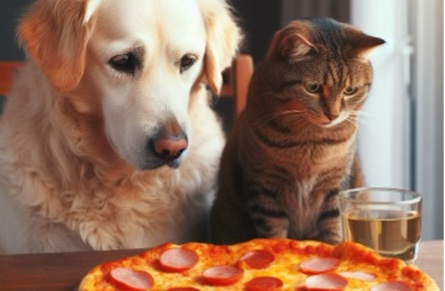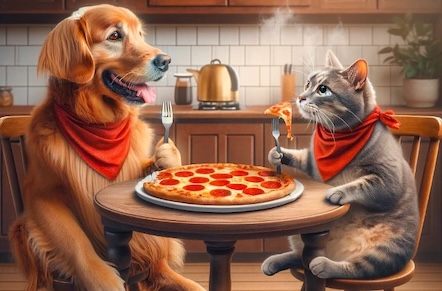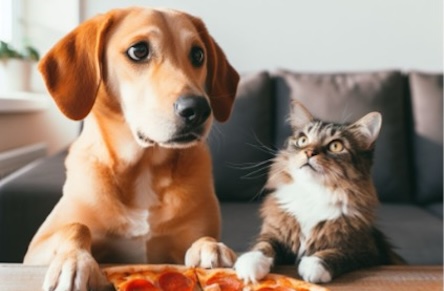3 MIN READ
Tasty treats or one to avoid? Our guide to pets and pizza eating
As soon as you open that takeaway pizza, its mouthwatering aroma and delicious combination of toppings is likely to attract the whole household, and we don’t just mean the humans.
A good pizza can be hard to resist. As you begin to enjoy a slice or two, your beloved pets may also be eyeing your meal with curiosity and longing.
The big question is, can your household pets safely indulge in a slice of pizza?
Spoiler alert: as nice as it is to share, it’s probably best not to with your pets!
We’re not animal experts, so would also point you to trusted sources such as the RSPCA and Dogs Trust for further information. In this blog, we will explore the somewhat delicate relationship between pets and pizza – addressing a few specific queries surrounding dogs, cats, and your favourite takeaway dish.

Can dogs eat pizza?
Dogs are loyal companions, usually by your side and eager to share in your experiences. That may extend to your culinary experiences if you let them.
However, when it comes to pizza, you may well want to exercise caution. While it's not toxic for dogs to consume pizza in small amounts, it's not a recommended treat for a few reasons.
While standard pizza toppings such as tomato, cheese and meats can be a source of protein and fats, they’re not designed to be a primary source of nutrition for your furry friend. Certain types of pizza also come with a few health risks.
Onions and garlic: If your toppings include onions or garlic, these are bad for dogs. Experts such as 4 Paws Veterinary Hospital advise these two foods are toxic to both dogs and cats.
Dough dangers: While a cooked pizza is usually fine – one point for takeaway pizza – if you’re making your own pizza, it comes with more danger. The RSPCA caution that the yeast used in pizza dough can cause digestive upset in dogs, in a similar way to alcohol, so keep your pets clear of any leftover dough.
High fat content: Pizza typically contains a high amount of saturated fats, which can lead to gastrointestinal issues in dogs. While it may be fine in small doses, excessive consumption of fatty foods can increase the risk of various health conditions in dogs.
Sodium overload: Pizza sauce and processed meats are often high in sodium. High sodium intake can lead to dehydration, kidney problems or elevated blood pressure in dogs.
Can dogs eat pizza crust?
In addition to questions about the pizza as a whole, we sometimes encounter questions about whether pizza crusts can be given as a dog treat. Believe it or not, some people don’t finish their pizza crusts, even ours, so sharing with their dog seems like a great way to avoid waste.
In general, the outer edge of the pizza can be viewed differently than the cheesy, saucy portion. Canines, in general, are likely to tolerate plain pizza crust better than the entire slice, and the crunchiness is something they will be familiar with from other dog snacks.
So, in a similar way to the advice on pizza overall, if you decide to give a pizza crust to your dog, make sure it's relatively plain and unseasoned, free of garlic or onions. And always be mindful of portion size to avoid overindulgence.
Can cats eat pizza?
Cats are often known for their fussy eating habits, unlike dogs. The RSPCA advise they are ‘obligate’ carnivores, which means their diet primarily consists of animal-based protein and they need it to survive. So, when it comes to pizza, if they’re even interested, it's key to exercise caution.
Processed meats: Processed meats such as pepperoni and sausage can be high in sodium and fats, which can be harmful to your feline friend's health.
Onions and garlic: Cats, like dogs, are susceptible to the toxic effects of onions and garlic.

Yeast and spices: The same concerns related to dogs and yeast will also apply to cats.
Dairy dilemma: Specialists such as Petplan advise that – contrary to the popular film depictions of cats loving milk from a saucer – many cats are actually lactose intolerant, especially as adults. So, the cheese found on most pizzas can often lead to digestive upset.
In summary, it's best to keep pizza away from your feline friend's diet. If you're looking for a special treat, opt for small pieces of cooked, unseasoned meat.

Dog, cats and pizza. The final verdict
While it's tempting to share your favourite food with your pets, not all human foods are ideal for their diets. The rich and highly seasoned ingredients which make pizza the explosion of flavour that humans have come to love doesn’t suit our pets so well.
And of course, remember that the yeast in pizza dough can lead to digestive issues, so if you’re ever making your own pizza then be sure to exercise additional caution.
So, while it may be a little disappointing that we don’t recommend introducing your pets to your favourite pizzas on a regular basis, think on the bright side.
That just means more pizza for you!

